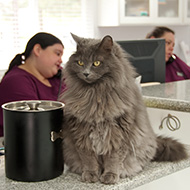Vet receptionist survey highlights growing desire for CPD

BVRA has noted that practices are increasingly turning to reception to help with the smooth running of their work.
A new survey by the British Veterinary Receptionists Association (BVRA) has revealed a growing appetite among reception staff to undertake more continuing professional development (CPD).
Figures from the BVRA's fifth annual member survey show that 65 per cent of its members want to do more CPD - a significant rise from 2018, when just 37 per cent wanted to do more. Recognition of the receptionist role has also increased within the practice to 38 per cent - up six per cent from 2021.
With veterinary teams facing increasing pressure across the country, BVRA has noted that practices are increasingly turning to reception to help with the smooth running of their work. The findings show that more receptionists wish to do CPD, yet over half of respondents (52%) said that their practice does not set aside time for them to study and learn.
Half of the participants (50%) cited keeping up to date and increasing knowledge as the benefits of undertaking CPD, with 'benefit to the practice and clients' rated as important by a further 46 per cent.
Average receptionist pay increased in 2022 from £9 to £10 per hour, suggesting a growing recognition to this more professional approach. However, this figure is in keeping with the mandatory living wage -and those satisfied with their pay fell from 37 per cent in 2018 to 31 per cent in 2022.
Around half of survey respondents said they felt that their pay does not fairly reflect the work that they do. One person said: “Our pay structure in no way represents our level of professionalism, responsibility, care and loyalty.”
A third of the participants (31%) said they work longer than their contracted hours on a regular basis, yet 29 per cent do not receive any overtime pay.
Only 41 per cent of respondents were satisfied or very satisfied with practice morale. Receptionist job satisfaction has marginally climbed to 4/10, with staff shortages, greater workload, and a rise in verbal abuse cited as the major causes of the poor score.
BVRA president Jaime Kiem believes the recruitment crisis facing the profession means that many practices have little choice but to turn to their receptionists.
“Vets being in short supply has led to an increase in workload for RVNs, and in turn the nursing team is in danger of being overwhelmed,” he said. “Practice managers and owners and head offices are increasingly aware that they have a highly experienced reception team who can help spread the load.
“CPD then becomes not only viable but necessary and desirable, and receptionists are ready to take on new challenges. Equally though, they expect to be recognised and rewarded for their skills and additional responsibilities.”
Despite 62 per cent of respondents saying that they felt supported by their line manager, a mere 23 per cent were happy with the progression opportunities available to them. Mr Kiem states that this is more proof of the desire for receptionists to help practices succeed.
“For the last five years we’ve seen receptionists step up to the new opportunities available to them,” he continued.
“The appetite for CPD is fantastic to see, and every day we see evidence of their commitment to making their practices better for all stakeholders. It’s wonderful to know that the value of the reception team is increasingly being recognised and the potential benefits for practices truly embracing a ‘one team’ approach are very obvious.”



 The RCVS has announced a new version of its 1CPD mobile app, with enhanced features for veterinary surgeons and veterinary nurses to record their continuing professional development.
The RCVS has announced a new version of its 1CPD mobile app, with enhanced features for veterinary surgeons and veterinary nurses to record their continuing professional development.